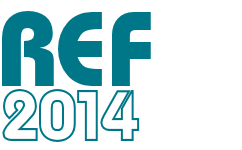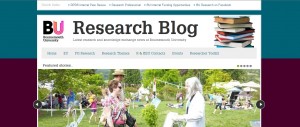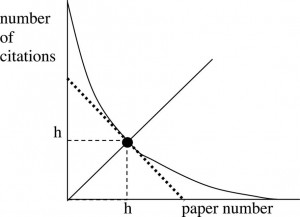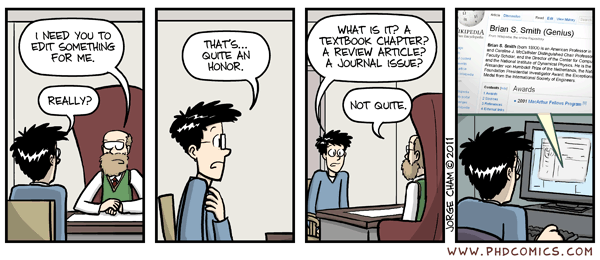 FP7 Synergy grants will enable small groups to bring together complementary skills, knowledge and resources to jointly address research problems at the frontier of knowledge, going beyond what the individual principal investigators could achieve alone. The budget for this call is €150 million and funding will cover up to 100 per cent of eligible direct costs.
FP7 Synergy grants will enable small groups to bring together complementary skills, knowledge and resources to jointly address research problems at the frontier of knowledge, going beyond what the individual principal investigators could achieve alone. The budget for this call is €150 million and funding will cover up to 100 per cent of eligible direct costs.
/ Full archive
REF week on the blog! A Ramble about REF
![]() It’s REF week on the Research Blog and I also have to give a talk to the BU Board on Thursday about progress with our REF preparations, but I am sitting here wondering what to write? Does this often happen to you? I often put these things off and turn my hand to something else, like the paper I am currently struggling to complete, or keeping up with my email correspondence rather than tackle the task in hand. But you see, here am I avoiding starting on the piece again, so I had better get started before it gets any later.
It’s REF week on the Research Blog and I also have to give a talk to the BU Board on Thursday about progress with our REF preparations, but I am sitting here wondering what to write? Does this often happen to you? I often put these things off and turn my hand to something else, like the paper I am currently struggling to complete, or keeping up with my email correspondence rather than tackle the task in hand. But you see, here am I avoiding starting on the piece again, so I had better get started before it gets any later.
 For the Board presentation I am taking a historical view of REF and its ancestors. It started out in 1985 as the Research Selectivity Exercise, before progressing in its third iteration to the Research Assessment Exercise (RAE) in 1992 which was the first time research funds (QR – Quality Research Income) was distributed as a consequence of the outcome. In some ways it was only in 1997 that universities had really got their act together and begun to take the RAE seriously, and by 2001 it was a major focus of energy in higher education and was beginning to result in a progressive concentration of research funding in a few key institutions. BU’s greatest success to date was in 2008 when we were the fourth most improved university in the country, and for the first time BU started to receive significant QR income as a result.
For the Board presentation I am taking a historical view of REF and its ancestors. It started out in 1985 as the Research Selectivity Exercise, before progressing in its third iteration to the Research Assessment Exercise (RAE) in 1992 which was the first time research funds (QR – Quality Research Income) was distributed as a consequence of the outcome. In some ways it was only in 1997 that universities had really got their act together and begun to take the RAE seriously, and by 2001 it was a major focus of energy in higher education and was beginning to result in a progressive concentration of research funding in a few key institutions. BU’s greatest success to date was in 2008 when we were the fourth most improved university in the country, and for the first time BU started to receive significant QR income as a result.
Apart from dominating the lives of many researchers, you may well ask what it has done for UK research. Well, the answer is actually a huge ton! In the 1970s, research in UK universities was funded via a government block grant and the UK was a middle-ranking research power, complacent, inefficient and underperforming. According to the recent BIS survey with the catchy title International Comparative Performance of the UK Research Base – 2011 the UK is now a leading research nation in the world, second only to the US. The much quoted headlines run something like: 1% of the world’s population, 3% of R&D spend, 4% of researchers, but 6% of articles, 10% of citations, 14% of the most cited articles. According to HEFCE, for every pound spent on research in the UK you get between four and seven pounds back. When seen in this context, the RAE has done its job extremely well by introducing competition into the sector. There are parallels here with the current move to introduce competition around student numbers.
Since RAE2008, goal posts have changed again as the name has changed to the Research Excellence Framework (REF) with the introduction of ‘Impact’ as an element of the assessment. In 2014, it will contribute 20% of the overall profile that a Unit of Assessment (UOA) will receive. At its simplest, impact is about justifying research spending from the public purse by demonstrating the societal benefit – economic, environmental, social, or cultural – from research. It is a great concept and speaks to the heart of societal relevance which we are placing at the centre of BU’s future research strategy. It will be assessed as part of REF via a series of case studies and each case study has to be based on a piece or body of research undertaken in the last 15 years, with an evidenced impact since 2008. The basic idea is that impact often takes time to come to fruition, but for a youthful institution like our own this is challenging since the research belongs to the university where it was done, not to the researcher. In the last 5 years there has been a steady influx of talented researchers to BU, but in many cases their impact belongs to another university! 
The need to evidence societal benefit is also important – it’s not enough just to have changed government policy for example; one needs to demonstrate the benefit of that change to ordinary people. The example we often use is that of seatbelts. Professor X does some research into seat belts and convinces government to legislate with respect to their introduction. This only counts, however, as interim impact – to complete the case study, one would have to demonstrate how that legislation has reduced road traffic accidents. So evidencing one’s claim is critical. I have used this example on several occasions but was somewhat challenged when an individual in the audience pointed out that this could also be construed in a negative way since seatbelts have reduced the number of organ donors! You will no doubt be able to guess at this point that I was talking to staff in HSC at the time.
The point is that it is all about the narrative you build from a piece of research and how you evidence that claim. There are some challenges for us around the issue of impact, but it also offers great opportunity. So I think it is time for me to finish here and go back to working on my Board presentation.
Getting Out There
When I finished my PhD here at BU in 2006, all I had to show for it was…a PhD. There is nothing wrong with that, but my research career only really began when I had completed my doctoral studies; I presented my first international conference paper the following year, and my first journal article finally appeared a year after that.
Now I’m a supervisor of PhD students, and most are already submitting their work to conferences and writing journal articles. This provides a corollary to my own advice and support, and in many ways it also holds me to account. In June, the Times Higher Education reported that:
“For those hoping to progress to a more stable academic career, the figures make for depressing reading. The NSF estimates that only 26 per cent of recent PhD recipients in the US will secure a tenure-track position. UK postdocs appear to have even more reason for pessimism” (Jump, 2011).
This is rather a bleak assessment, but even so, it is clear that a PhD is no longer the ‘entry level’ route into a research career it once was. At BU, we want our PGRs to be competitive, so it is imperative that our PGRs have a clutch of conference papers, a publication-or-two and a bit of teaching experience behind them on exiting their doctoral research.
This workload must of course be carefully managed, but there is nothing to stop full-time BU PGRs undertaking our P/G Cert in Education Practice. As for publications, there are now hundreds of open access journals online, and even some of the most prestigious ones have themed issues and room for smaller ‘research reports’ on work in progress. All supervisors need to be aware of these places and not leave it for their students to find them.
BU has a postgraduate conference each year, which is an excellent nursery for presenting at national and international conferences later. Most subject areas now have established conferences; the Media, Communication and Cultural Studies Association has both a national conference and a dedicated postgraduate one – which BU hosted this year. Just last week I met an eminent broadcasting history scholar who praised a BU PGR she had seen at a recent symposium in Winchester. This can only reflect well on us and validates the students’ work.
So if our PhD students finished with…just a PhD, then to an extent we have failed them. Part of being a good PhD supervisor is not just to help bring the project to completion, but to also nurture the beginnings of a research career; the dialogue with ‘outside’ scholarship needs to get going as soon as possible.
Richard Berger – Associate Prof & Head of Postgraduate Research, The Media School.
BU Santander Scholarships 2011-12 round 2 – apply now!

Santander is offering four x £5,000 research and travel grants to BU staff and research students
After the success of the Santander Scholarship competition a couple of months ago, Santander have offered BU staff and research students the opportunity to apply for further scholarships in a second round of funding.
The funds must be used for a specific project to build on or develop links with at least one university from the Santander overseas network. Awards will be announced in January 2012, and funds must be spent before the end of July 2012. Preference will be given to applications received from postgraduate research students and early career researchers.
Funds can only be used to cover direct costs (i.e. not salary costs or overheads).
To apply complete the Santander application form and submit it by email to Susan Dowdle: sdowdle@bournemouth.ac.uk
Successful applicants will be expected to participate in general PR activities about their research. This may involve attending events and promoting the benefits of the funding.
The closing date for applications is Friday 9 December 2011.
Unsuccessful submissions from the last round of the Santander Scholarship funding cannot be resubmitted to this round.
Good luck 🙂
REF week on the Blog! BU REF preparation and governance
 This week is REF Week on the Blog! Each day we will be explaining a different element of the Research Excellence Framework (REF) as a quick reference guide to help you prepare for the forthcoming REF exercise – REF2014.
This week is REF Week on the Blog! Each day we will be explaining a different element of the Research Excellence Framework (REF) as a quick reference guide to help you prepare for the forthcoming REF exercise – REF2014.
Internal preparations for the BU submission to the REF have already started and you can keep up to date by reading the BU REF Highlight Reports. These are published regularly and detail all of the recent developments (internal and external) with the REF (see the link to the I-drive at the end of the post).
Two internal groups have been established to oversee preparations for the REF:
 RASG – The REF Academic Steering Group (RASG) has been established as the primary decision-making body for the BU REF preparations. It first met on 14 June 2010 and normally meets on a monthly basis. The RASG Terms of Reference (including a list of members) can be accessed via the I-drive.
RASG – The REF Academic Steering Group (RASG) has been established as the primary decision-making body for the BU REF preparations. It first met on 14 June 2010 and normally meets on a monthly basis. The RASG Terms of Reference (including a list of members) can be accessed via the I-drive.
RALT – The REF Academic Leadership Team (RALT). RALT met for the first time on 27 September 2010 and will meet when required (currently this is on a monthly basis). Members of RALT include all of the RASG members plus the REF UOA Leaders. The list of REF UOA Leaders and the RALT Terms of Reference can be access on the I-drive.
![]() BU is currently working on a REF Code of Practice and some FAQs around REF preparation, staff eligibility, staff selection, etc., which will be available from the BU Research Blog in due course.
BU is currently working on a REF Code of Practice and some FAQs around REF preparation, staff eligibility, staff selection, etc., which will be available from the BU Research Blog in due course.
The Research Development Unit (RDU) are managing and administering the internal REF process. If you have any questions then please do ask Anita Somner or Julie Northam.
You can access all of this information regarding the BU preparations for the REF via the I-drive: I:\CRKT\Public\RDU\REF
You can access the latest presentation about the REF, written by the REF team, here: REF slide pack Sep 2011
Check out the posts appearing on the Blog every day next week as part of REF Week!
EU funding for Information & Communication Research
 ERA-Net CHIST-ERA (European Coordinated Research on Long-term Challenges in Information and Communication Sciences and Technologies) invites proposals for international research project grants. These support highly innovative and multidisciplinary collaborative projects in information and communication sciences and technologies with the potential for significant scientific and technical impacts. Proposals for this call should address the following topics: from data to new knowledge (D2K); green ICT, towards zero power ICT (G-ICT). Institutions from France, the UK, Spain, Germany, Ireland, Austria, Poland, Switzerland, Turkey, Romania and Luxembourg may apply. Projects should typically last for two to three years, and are expected to request a maximum of €2 million each.
ERA-Net CHIST-ERA (European Coordinated Research on Long-term Challenges in Information and Communication Sciences and Technologies) invites proposals for international research project grants. These support highly innovative and multidisciplinary collaborative projects in information and communication sciences and technologies with the potential for significant scientific and technical impacts. Proposals for this call should address the following topics: from data to new knowledge (D2K); green ICT, towards zero power ICT (G-ICT). Institutions from France, the UK, Spain, Germany, Ireland, Austria, Poland, Switzerland, Turkey, Romania and Luxembourg may apply. Projects should typically last for two to three years, and are expected to request a maximum of €2 million each.
Our snazzy new blog!
 Welcome to the launch of our snazzy new look BU Research Blog, designed for us by the Centre for Excellence in Media Practice (CEMP) in the Media School! The redesign was to make the blog look more professional and easier to navigate. In the seven months the blog has been running we’ve had over 600 posts, including regular posts by the PVC and the Deputy Deans. Because of the number of posts we’ve generated, it is often easy to miss out on some of the content so the redesign should hopefully make it easier to browse previous content and find related information about R&KE activities at BU.
Welcome to the launch of our snazzy new look BU Research Blog, designed for us by the Centre for Excellence in Media Practice (CEMP) in the Media School! The redesign was to make the blog look more professional and easier to navigate. In the seven months the blog has been running we’ve had over 600 posts, including regular posts by the PVC and the Deputy Deans. Because of the number of posts we’ve generated, it is often easy to miss out on some of the content so the redesign should hopefully make it easier to browse previous content and find related information about R&KE activities at BU.
In addition to the main research blog, there are several other important sections to the blog:
- EU Research Blog – your one stop shop for everything to do with EU research funding!
- PG Research Blog – news and information for postgraduate research students and supervisors at BU.
- Research Themes – keep up to date with current developments with the emerging 8 BU research themes. Each theme has its own section of the blog and we encourage all academics to contribute to discussions around the themes.
- R&KEO Contacts – information (including contact details) for all staff members in the Research & Knowledge Exchange Office so you know who we are!
- Events – a calendar of all research and knowledge exchange events, both internal and external.
- Researcher Toolkit – information about BU-endorsed systems, methods and policies that you may need when undertaking research at BU.
Email subscribers to the blog will continue to receive the Daily Digest email every morning at 10am.
The blog is owned by everyone at BU with an interest in research and knowledge exchange. If you would like access to add your own posts to the blog then contact Susan Dowdle and she will set you up with access and get you blogging in no time 🙂
We’re always open to feedback about the blog so if you have any comments about the redesign (or any other aspect of the blog) then please let us know!
Good luck & Congratulations!
 There have been a number of large scale, cross-School and/or inter-university collaborative bids, internally led by members of the Professoriate, submitted this month which is excellent news. Good luck therefore to Edwin van Teijlingen and Anthea Innes in HSC for submitting two large collaborative proposals to the EC under the FP7 Health calls, to Alan Fyall, Feifei Xu (both ST) and Adrian Newton (ApSci) for submitting a cross-School and inter-university collaborative bid to ESPA. Good luck also to Oleg Fryazinov (MS) for a bid to the European Research Council, Vijay Reddy, John Fletcher and Richard Gordon (ST) for submitting a bid to the ESRC, Alan Fyall, Dimitrios Buhalis, Philip Alford and John Brackstone (ST) for a bid to the ESRC’s Knowledge Exchange call, Simon Thompson (DEC) for a large bid to the ESRC’s (Open Research Area in Europe) call, Phil MacGregor (MS) for a fellowship bid to the AHRC, and to Sarah Hean (HSC) for a bid to the ESRC.
There have been a number of large scale, cross-School and/or inter-university collaborative bids, internally led by members of the Professoriate, submitted this month which is excellent news. Good luck therefore to Edwin van Teijlingen and Anthea Innes in HSC for submitting two large collaborative proposals to the EC under the FP7 Health calls, to Alan Fyall, Feifei Xu (both ST) and Adrian Newton (ApSci) for submitting a cross-School and inter-university collaborative bid to ESPA. Good luck also to Oleg Fryazinov (MS) for a bid to the European Research Council, Vijay Reddy, John Fletcher and Richard Gordon (ST) for submitting a bid to the ESRC, Alan Fyall, Dimitrios Buhalis, Philip Alford and John Brackstone (ST) for a bid to the ESRC’s Knowledge Exchange call, Simon Thompson (DEC) for a large bid to the ESRC’s (Open Research Area in Europe) call, Phil MacGregor (MS) for a fellowship bid to the AHRC, and to Sarah Hean (HSC) for a bid to the ESRC.
Good luck also to Peter Comninos and Dan Cox (MS) for an Interreg bid, Vijay Reddy (ST) for a bid for pilot funding from the Daiwa Anglo-Japanese Foundation, Clive Andrewes (HSC) for a short course proposal to Dorset Healthcare University NHS Foundation Trust, John Tarrant (HSC) for a small bid to Persides, Sue Way (HSC) for a bid to NHS Portsmouth, and to Maggie Hutchings (HSC) and Jacqui Taylor and Becky House (DEC) for two bids to the Higher Education Academy.
 Congratulations to Crispin Farbrother (ST) for a small consultancy contract with Dorset County Hospital, Richard Gordon (ST) for securing another training contract with the Foreign and Commonwealth Office, Jon Wardle (MS) for a production contract with Skillset, Mark Maltby (ApSci) for a small bones consultancy contract with Bedfordshire County Council, Roger Herbert (ApSci) for winning a contract with Shellfish Association of Great Britain, and to Gill Jordan (HSC) who has been awarded a large contract with the South West Strategic Health Authority.
Congratulations to Crispin Farbrother (ST) for a small consultancy contract with Dorset County Hospital, Richard Gordon (ST) for securing another training contract with the Foreign and Commonwealth Office, Jon Wardle (MS) for a production contract with Skillset, Mark Maltby (ApSci) for a small bones consultancy contract with Bedfordshire County Council, Roger Herbert (ApSci) for winning a contract with Shellfish Association of Great Britain, and to Gill Jordan (HSC) who has been awarded a large contract with the South West Strategic Health Authority.
Well done to Steve Calver and the MRG team for securing four contracts with various organisations, Stephanie Farmer (Red Balloon, MS) for number of contracts with organisations including DM Orthotics Ltd and Dorset Healthcare NHS Trust, and to Bronwen Russell and the Bournemouth Archaeology team (ApSci) for two contracts with Christchurch Borough Council and Donhead St Andrews Parish Council.
Best wishes
Matthew
INFER Mini–Workshop on Predictive Analytics
Nowadays web users generate a lot of data in a form of web logs. This data can tell us a lot about visitor behavior, their demands and preferences. Predictive web analytics is aimed at understanding and predicting behavioral patterns of users in various web-based applications or services: e-commerce, mass-media, and entertainment industries. This mini workshop focuses on challenges and techniques in predictive web analytics.
If you are interested to find out what can be predicted from visitor behavior on the web and how it can be done, welcome to attend!
Date: Monday, 31/10/2011
Time: 4pm – 6pm
Place: PG143, Poole House, Talbot Campus
4pm – 5pm
Mykola Pechenizkiy will talk about Context Aware Predictive Analytics: Motivation, Potential, Challenges
5pm – 6pm
Omar Kudmany will talk about Web log pre-processing using Complex Event Processing technologies
REF week on the Blog! What were the HEFCE REF pilots?
 This week is REF Week on the Blog! Each day we will be explaining a different element of the Research Excellence Framework (REF) as a quick reference guide to help you prepare for the forthcoming REF exercise – REF2014.
This week is REF Week on the Blog! Each day we will be explaining a different element of the Research Excellence Framework (REF) as a quick reference guide to help you prepare for the forthcoming REF exercise – REF2014.
What were the HEFCE REF pilots? – HEFCE ran two pilot exercises with HEIs in the sector during the development of the REF. The first exercise was a bibliometrics pilot, and the second was an impact pilot.
 Bibliometrics pilot – HEFCE ran a pilot exercise in the construction of bibliometric indicators of research quality in 2008-09, using Scopus and the Web of Scienceas the test databases. BU was chosen as one of 22 institutions to be part of phase one of the pilot exercise. This involved the provision of publication details to HEFCE, and cross-checking BU information on Web of Science and Scopus. Where possible this was completed using BU’s institutional repository, BURO. The outcome of the bibliometrics pilot was that bibliometric indicators are not yet sufficiently robust enough in all disciplines to be used formulaically or as a primary indicator of research quality. However HEFCE agreed that there was scope for bibliometrics to inform the process of expert review in some units of assessment. These findings resulted in the decision that some UOA sub-panels will receive citation data (the number of times an output has been cited, calculate via Scopus) as additional information about the academic significance of the outputs.
Bibliometrics pilot – HEFCE ran a pilot exercise in the construction of bibliometric indicators of research quality in 2008-09, using Scopus and the Web of Scienceas the test databases. BU was chosen as one of 22 institutions to be part of phase one of the pilot exercise. This involved the provision of publication details to HEFCE, and cross-checking BU information on Web of Science and Scopus. Where possible this was completed using BU’s institutional repository, BURO. The outcome of the bibliometrics pilot was that bibliometric indicators are not yet sufficiently robust enough in all disciplines to be used formulaically or as a primary indicator of research quality. However HEFCE agreed that there was scope for bibliometrics to inform the process of expert review in some units of assessment. These findings resulted in the decision that some UOA sub-panels will receive citation data (the number of times an output has been cited, calculate via Scopus) as additional information about the academic significance of the outputs.
Impact pilot – During 2009-10, HEFCE ran a second pilot exercise, this time with the aim of developing proposals for how to assess research impact in the REF. The impact pilot involved 29 HEIs submitting evidence of impact (case studies and statements) which were assessed by pilot expert panels in five units of assessment:
- Clinical Medicine
- Physics
- Earth Systems and Environmental Sciences
- Social Work and Social Policy & Administration
- English Language and Literature
The impact pilot completed in autumn 2010 and the final report (including recommendations and findings) was published on 11 November 2010. The full report can be accessed on the HEFCE website. For a brief summary of the report, please download the Impact Pilot Summary. You can also read our REF Impact FAQs.
You can access the latest presentation about the REF, written by the REF team, here: REF slide pack Sep 2011
Check out the posts appearing on the Blog every day this week as part of REF Week!
European Energy Research Alliance seeks additional partners
 In spring 2012, fifteen other organisations will be selected as partners for a two-year term. The Alliance is now made up of ten energy research organisations, which got together in October 2008 to develop joint research programmes. EERA partners must pay an annual fee worth €10,000. Only one organisation can join per EU member state. The call for expressions of interest closes on 1 February 2012.
In spring 2012, fifteen other organisations will be selected as partners for a two-year term. The Alliance is now made up of ten energy research organisations, which got together in October 2008 to develop joint research programmes. EERA partners must pay an annual fee worth €10,000. Only one organisation can join per EU member state. The call for expressions of interest closes on 1 February 2012.
Study reveals risks from carp parasite
A joint Bournemouth University(BU) & Environment Agency (EA) study, published in the Public Library of Science journal ‘PLoS One’, has revealed how infections of the tapeworm Bothriocephalus acheilognathi affect juvenile carp Cyprinus carpio in fisheries in England andWales.
 Dr Chris Williams from the EA said: “This work provides important evidence about how alien parasites can cause harm to our fish populations. It gives us a better understanding of the risks these parasites pose to fish, the environment and our fisheries.”
Dr Chris Williams from the EA said: “This work provides important evidence about how alien parasites can cause harm to our fish populations. It gives us a better understanding of the risks these parasites pose to fish, the environment and our fisheries.”
The study showed the parasite comprised up to 12 % of an infected carp’s body weight. The tapeworm was always found in the intestine, causing considerable damage. Infected fish were found to be lower in weight, growing more slowly and feeding on less nutritive foods.
Dr Robert Britton, who led the study from BU’s ecology department, said: “It was highly apparent that infected carp suffered multiple pathological and ecological consequences, suggesting fisheries infected with Bothriocephalus will be damaged.”
The fact that carp fisheries and the recreational value of carp fishing are worth millions of pounds to the UK economy means it is vital to prevent infection. Fortunately, the Asian tapeworm is currently subject to strict regulation inEnglandandWalesby the Environment Agency.
Dr Williams continued: “We will use this knowledge to advise our regulation of fish movements and the advice we provide to fishery managers to minimise the spread and impact of these parasites.”
Fusion event 14 December – Launch of the BU Research Themes

On the afternoon of the 14 December 2011 we will be launching the Fusion Seminar series with an event focused around launching the eight BU Research Themes. It would be great if you could hold this date within your calendars and register for the event.
January through to March the monthly Fusion Seminar series will focus on sharing research, education and professional practice within BU and will culminate in April in a one-day Fusion conference involving both staff and students when the key research themes will be centre stage. Dates for these events are:
- 18 January (1.5 hours)
- 22 February (1.5 hours)
- 21 March (1.5 hours)
- 18 April (whole day)
The event on the 14 December is the first in this programme and will focus on Fusion within the eight BU Research Themes. Following consultation these themes are now fixed as: (1) Health, Wellbeing & Aging; (2) Culture & Society; (3) Creative & Digital Economies; (4) Entrepreneurship & Economic Growth; (5) Environmental Change & Biodiversity; (6) Green Economy & Sustainability; (7) Leisure & Recreation; and (8) Technology & Design. The event will combine time for cross-BU networking within these themes, with some short keynote talks by theme champions focusing on defining the challenges in education, research & practice within each theme. We are still looking for one or more champions per theme to step forward and help shape the theme and also the event on the 14 December. Please get in touch with either myself or Julie Northam. Once we have all the speakers in place we will be back in touch with a full programme.
You can register for the event and sign-up for the themes most relevant to you using the form below. It is important to register for the themes that interest you so that we can schedule the parallel sessions accordingly to avoid clashes!
Best wishes
Matthew
REF week on the Blog! Introduction to the Research Excellence Framework
 Next week is REF Week on the Blog! Each day we will be explaining a different element of the Research Excellence Framework (REF) as a quick reference guide to help you prepare for the forthcoming REF exercise – REF2014.
Next week is REF Week on the Blog! Each day we will be explaining a different element of the Research Excellence Framework (REF) as a quick reference guide to help you prepare for the forthcoming REF exercise – REF2014.
What is the REF? – The Research Excellence Framework (REF) has replaced the Research Assessment Exercise (RAE) as the new process for assessing the volume and quality of research in UK HEIs. As with the RAE, the results of the REF will determine the annual quality-related research (QR) grant distributed from HEFCE to HEIs in England.
 The REF will assess research excellence through a process of expert review, informed by indicators where appropriate. It will be based on HEIs submitting evidence of their research activity and outcomes, to be assessed by expert panels.
The REF will assess research excellence through a process of expert review, informed by indicators where appropriate. It will be based on HEIs submitting evidence of their research activity and outcomes, to be assessed by expert panels.
The REF will focus on assessing three elements, which together reflect the key characteristics of research excellence (weightings for REF2014 in brackets):
- The quality of research outputs (65%)
- The reach and significance of the impact of research (20%)
- The vitality of the research environment (15%)
Each of these elements will be assessed against appropriate criteria for excellence, and rated by expert panels on a five-point scale ranging from 4* (excellent, world-leading) to Unclassified.
The REF assessment period started on 1st January 2008 and the first REF submission will take place in Autumn 2013, with the results published in December 2014.
You can access the latest presentation about the REF, written by the REF team, here: REF slide pack Sep 2011
Check out the posts appearing on the Blog every day next week as part of REF Week!
Open Access publishing event is a success!
Despite a near accident with a jug of milk, 30 cups and a projector screen twenty minutes before the start of the event, Wednesday’s open access (OA) publishing seminar was a huge success! Roughly 30 BU academics, researchers and PGR students attended the event which was aimed at increasing awareness, dispelling some of the myths, and demonstrating the benefits of open access publishing. There was also an opportunity for attendees to find out about the recently launched BU Open Access Publication Fund.
 The event opened with a fantastic presentation by Dr Alma Swan (Key Perspectives Ltd) who spoke passionately about the benefits of open access publishing and archiving, showing clear demonstrations of how making your research available in open access outlets (and in BURO) dramatically increases the number of citations and leads to more people downloading the research papers. Of particular interest were her stats on who actually downloads open access papers published via the PubMed outlet: other academics and university students only account for 25% of downloads, and by far the biggest consumer of open access literature are ‘citizens’ (i.e. independent researchers, patients and their families, teachers, amateur or part-time researchers, other interested minds), who account for 40% of the research papers downloaded from PubMed. These are almost always people who would not normally have access to research published in traditional print journals.
The event opened with a fantastic presentation by Dr Alma Swan (Key Perspectives Ltd) who spoke passionately about the benefits of open access publishing and archiving, showing clear demonstrations of how making your research available in open access outlets (and in BURO) dramatically increases the number of citations and leads to more people downloading the research papers. Of particular interest were her stats on who actually downloads open access papers published via the PubMed outlet: other academics and university students only account for 25% of downloads, and by far the biggest consumer of open access literature are ‘citizens’ (i.e. independent researchers, patients and their families, teachers, amateur or part-time researchers, other interested minds), who account for 40% of the research papers downloaded from PubMed. These are almost always people who would not normally have access to research published in traditional print journals.
 The second speaker was Willow Fuchs from the Centre for Research Communications (CRC) at the University of Nottingham. Willow gave an excellent presentation on the Sherpa Services that were developed and maintained by the CRC. These include RoMEO, Juliet and OpenDOAR. Authors can look up journals using the RoMEO database to check whether archiving in repositories is permitted (such as BURO) and, if so, what version of the paper can be made available. Authors can also easily check the publisher’s policies and see whether the journal offers a hybrid publishing option (i.e. the paper will still be published in the traditional print journal but will also be made freely available via the internet). It currently covers over 1,000 publishers and is an excellent source of information. Willow also mentioned the Juliet database which lists funder open access requirements, and the OpenDOAR database which is a searchable directory of open access repositories, such as BURO. All three of the Sherpa Service resources are freely accessible via the links in the text above.
The second speaker was Willow Fuchs from the Centre for Research Communications (CRC) at the University of Nottingham. Willow gave an excellent presentation on the Sherpa Services that were developed and maintained by the CRC. These include RoMEO, Juliet and OpenDOAR. Authors can look up journals using the RoMEO database to check whether archiving in repositories is permitted (such as BURO) and, if so, what version of the paper can be made available. Authors can also easily check the publisher’s policies and see whether the journal offers a hybrid publishing option (i.e. the paper will still be published in the traditional print journal but will also be made freely available via the internet). It currently covers over 1,000 publishers and is an excellent source of information. Willow also mentioned the Juliet database which lists funder open access requirements, and the OpenDOAR database which is a searchable directory of open access repositories, such as BURO. All three of the Sherpa Service resources are freely accessible via the links in the text above.
 The event then focused on BU’s experience of open access publishing with presentations from Prof Edwin van Teijlingen and Prof Peter Thomas. Prof Edwin van Teijlingen (HSC) talked of the benefits of making his research findings freely available in terms of free access to the information, the quick turnaround times, and the high quality of the open access publications available in his field. Prof Peter Thomas primarily focused on the quick publication times which are particularly beneficial for the publication of the study protocols for the randomised control trials he has been involved with (his experience is that there is usually only 2-5 months between submitting the paper and its publication). He also displayed the access statistics from BioMed Central showing how many downloads there had been each month of his paper (between 18-77 downloads per month).
The event then focused on BU’s experience of open access publishing with presentations from Prof Edwin van Teijlingen and Prof Peter Thomas. Prof Edwin van Teijlingen (HSC) talked of the benefits of making his research findings freely available in terms of free access to the information, the quick turnaround times, and the high quality of the open access publications available in his field. Prof Peter Thomas primarily focused on the quick publication times which are particularly beneficial for the publication of the study protocols for the randomised control trials he has been involved with (his experience is that there is usually only 2-5 months between submitting the paper and its publication). He also displayed the access statistics from BioMed Central showing how many downloads there had been each month of his paper (between 18-77 downloads per month).
Prof Matthew Bennett closed the event by emphasising that the consumers of research not just academics; as BU moves to society-led research then the need to communicate research findings with non-academics will become even more important. He gave an overview of the recently launched BU Open Access Publication Fund, explaining how BU academics can access central funds to publish their papers in open access outlets (including traditional print journals with a hybrid option to make the paper freely available on the internet in addition to the print journal). Two BU academics have already benefited from the central fund and published their research in open access outlets – Prof Colin Pritchard (HSC) who published in the Journal of the Royal Society of Medicine, and Dr Julie Kirkby (DEC) who will shortly have a paper published by Plos ONE.
All in all this was an excellent event and a fabulous launch for the new open access fund! Expect to read more on open access publishing on the Blog over the coming months!
You can access the slides from the event from this I-drive folder: I:\CRKT\Public\RDU\Open access\event 261011
Bibliometrics need not be baffling!
 What are bibliometrics?
What are bibliometrics?
Bibliometrics are a set of methods used to study or measure text and information. Citation analysis and content analysis are the most commonly used bibliometric methods. Bibliometric methods can help you explore the academic impact of a field, a set of researchers or a particular journal paper.
What is citation analysis?
Citation analysis looks at where a document has been referenced by others since it was originally published – this information can be used when searching for materials and in analysing their merit. Undertaking citation analysis on yourself is useful for assessing your own research performance. Specialist databases such as Web of Science and Scopus provide various tools for doing this analysis.
Searching for citation information on the Web of ScienceSM
 Web of ScienceSM is hosted by Thomson Reuters and consists of various databases containing information gathered from thousands of scholarly journals, books, book series, reports, conference proceedings, and more:
Web of ScienceSM is hosted by Thomson Reuters and consists of various databases containing information gathered from thousands of scholarly journals, books, book series, reports, conference proceedings, and more:
- Science Citation Index Expanded (SCI-Expanded)
- Social Sciences Citation Index (SSCI)
- Arts & Humanities Citation Index (A&HCI)
- Index Chemicus (IC)
- Current Chemical Reactions (CCR-Expanded)
- Book Citations Index – coming soon!
These databases enable you to perform a variety of tasks, such as search published literature, undertake citation analysis, track new research within a particular field, and identify chemical compounds and reactions. Data is available from around 1990, and even earlier in some cases.
By producing a Web of ScienceSM Citation Report for yourself (or for others), you can find out who is citing your work and how it is being used in other people’s publications so that you can get a feel for the overall citation activity around your outputs. Search for an author’s name and then click on ‘Create Citation Report’ from the results page.
Producing this report will give you information such as the number of items published in each year, the number of citations to those items for each year, the average number of citations per item, and your h-index based on this information. Click here for web tutorials on how to use the Web of ScienceSM.
Searching for citation information on Scopus
Scopus, part of Elsevier’s SciVerse facility, was launched in November 2004 and is an abstract and citation database containing around 19,500 titles from more than 5,000 publishers. Scopus enables researchers to track, analyse and visualise research, and has broad coverage of the scientific, technical, medical and social sciences fields and, more recently, the arts and humanities. Data is currently largely available from 1996 but it does go back further than this in some cases. For more information about Scopus, click here.
By searching for yourself (or others) on the Scopus database using the author search facility, you can use the ‘View Citation Overview’ function to get a feel for the citations activity around your outputs. The information is presented and can be analysed in a number of ways, including pie charts, graphs and tables, and shows the breakdown of citation activity over a number of years and your h-index based on this data. Various tutorials on using Scopus can be accessed here.
Scopus and the Research Excellence Framework (REF): ![]() HEFCE has announced that Elsevier have been chosen as the provider of citation data services to the REF sub-panels that have chosen to make use of citation information as part of the assessment process. Using the Scopus database, HEFCE will provide the relevant sub-panels with raw citation data (i.e. not normalised) accompanied by contextual information, which will assist those panel members in making decisions about the outputs part of the REF submissions.
HEFCE has announced that Elsevier have been chosen as the provider of citation data services to the REF sub-panels that have chosen to make use of citation information as part of the assessment process. Using the Scopus database, HEFCE will provide the relevant sub-panels with raw citation data (i.e. not normalised) accompanied by contextual information, which will assist those panel members in making decisions about the outputs part of the REF submissions.
What is the h-index?
The h-index was conceived by Professor Jorge Hirsch in 2005 within the field of physics and is fast becoming one of the most widely used metrics for research evaluation. It is also becoming increasingly used as a measure of research activity and academic prominence across various subject areas.
The benefit of the h-index over other citation measures is that it is not influenced by a few highly cited papers and it ignores any papers that remain uncited. It is calculated based on the number of papers by a particular author that receive h or more citations. Therefore, an h-index of 15 means that a person has at least 15 papers that have been cited 15 times or more. Fortunately, the Web of Science and Scopus both automatically calculate the h-index as part of their citation analysis functions so there is no need to work it out manually.
If you’d like to know more about the h-index, the original research document can be accessed from the Cornell University Library webpage.
What are journal impact factors?
Journal Impact Factors are published annually on the Web of Knowledge and provide a way of ranking journals based on the citation performance of articles published by those journals from the previous two years. For more information about how impact factors are calculated and how they can be used, see my previous blog post.
Other methods of ranking journals also exist, such as the ABS Academic Journal Quality Guide and the ERA journal ranking list. Journal rankings can be useful when choosing which journal to publish in, for example.
A glimpse of Horizon 2020….
 It has been announced that Horizon 2020 will include three components for basic research, industrial technology, and ‘grand challenges’
It has been announced that Horizon 2020 will include three components for basic research, industrial technology, and ‘grand challenges’
- ‘Excellence in the science base’ will fund basic research.
- ‘Creating industrial leadership and competitive frameworks’ will fund business research and innovation, in particular for small enterprises.
- ‘Tackling societal challenges’ will fund research that responds to grand challenges such as food security and climate change.
Horizon 2020 will increase funding for innovation through funding schemes for ‘prototyping, dissemination, demonstration, pilots, testing, user involvement, market replication, and public procurement’ and will use a single, standardised set of rules across all funding instruments to simplify procedures. In addition, it will expand the Open Access Pilot that promotes the free dissemination of EU-funded scientific publications, which now covers about 20 per cent of the Framework 7 budget.
Exploring research impact
 Why do I need to think about the impact of my research?
Why do I need to think about the impact of my research?
Given the current economic situation, tighter spending reviews and increasing constraints on public spending, there is more of a need than ever to demonstrate the economic, social and cultural benefits of publicly funded research to wider society. This broad definition of research impact is gradually being adopted and used in a number of ways by various funding bodies that need to be accountable for the money they distribute, such as the Research Councils UK (RCUK), the Higher Education Funding Council for England (HEFCE) and some charities and trusts.
Consequently, there is now greater impetus to involve researchers more directly in demonstrating the impact of their research. Researchers therefore need to actively think about how to demonstrate the value of their research and its wider impact, from the application stage through to project completion, dissemination and beyond.
This impact pathway is a fluid process and research impacts can occur at any stage in the research life cycle – often they can stem from unexpected or unintended outcomes as well as from planned activity. The key is to start thinking about potential beneficiaries and pathways to impact during the project planning stage and to continue to monitor the outcomes in an ongoing way. This will help you to make new connections and partnerships beyond the project itself, and to put in place resources and activities that enable you to make the most of opportunities for achieving impact when they arise. Keeping a record of activity related to a project, and gathering evidence to support impacts and outcomes achieved, is recommended to enable you to effectively fulfil any current and future reporting requirements.
What are funders looking for in terms of impact?
Many funding bodies, particularly larger ones such as RCUK, have a section on their funding application form that specifically asks you to consider the potential pathways to impact as appropriate for the nature of the research you’re proposing to conduct. This is to enable funders to support you in undertaking these activities – you’re not being asked to predict the actual outcomes that the research will achieve.
Each funder understands that there is great diversity in the kinds of impact that are possible; they also acknowledge that this diversity is a great strength of the research community in addressing such things as urgent social issues, remaining competitive in global markets and improving quality of life. It is about embracing the ways in which research-related knowledge and skills benefit individuals, organisations and nations.
In thinking about potential impacts, you might find it useful to consider the potential beneficiaries of the research – innovative and creative approaches to engaging beneficiaries and fostering impact are generally strongly encouraged by the funders. For more specific information about completing the impact sections on the RCUK application forms and for an indication of the potential range of impacts that can be generated from research, visit the RCUK impact web-pages.
Furthermore, the RCUK has just launched the Research Outcomes Project, which requires all RCUK grant holders to upload information about the various outcomes that have resulted from each of the RCUK-funded projects they are responsible for, and one of those categories is impact.
What is HEFCE looking for in terms of research impact for the Research Excellence Framework (REF)?
![]() As part of submitting to the REF, HEFCE requires higher education institutions to provide evidence of research impact that has been realised within the assessment period but which stems from research undertaken at that institution within a number of years prior to the assessment period. Therefore, rather than looking forward to the kinds of impact that might stem from a research project, HEFCE is asking for information about impacts that are being, or have already been, achieved within a set timeframe. More information about how HEFCE is approaching impact in the REF is available from the HEFCE REF web-pages.
As part of submitting to the REF, HEFCE requires higher education institutions to provide evidence of research impact that has been realised within the assessment period but which stems from research undertaken at that institution within a number of years prior to the assessment period. Therefore, rather than looking forward to the kinds of impact that might stem from a research project, HEFCE is asking for information about impacts that are being, or have already been, achieved within a set timeframe. More information about how HEFCE is approaching impact in the REF is available from the HEFCE REF web-pages.












 Beyond Academia: Exploring Career Options for Early Career Researchers – Online Workshop
Beyond Academia: Exploring Career Options for Early Career Researchers – Online Workshop UKCGE Recognised Research Supervision Programme: Deadline Approaching
UKCGE Recognised Research Supervision Programme: Deadline Approaching SPROUT: From Sustainable Research to Sustainable Research Lives
SPROUT: From Sustainable Research to Sustainable Research Lives BRIAN upgrade and new look
BRIAN upgrade and new look Seeing the fruits of your labour in Bangladesh
Seeing the fruits of your labour in Bangladesh ECR Funding Open Call: Research Culture & Community Grant – Apply now
ECR Funding Open Call: Research Culture & Community Grant – Apply now ECR Funding Open Call: Research Culture & Community Grant – Application Deadline Friday 12 December
ECR Funding Open Call: Research Culture & Community Grant – Application Deadline Friday 12 December MSCA Postdoctoral Fellowships 2025 Call
MSCA Postdoctoral Fellowships 2025 Call ERC Advanced Grant 2025 Webinar
ERC Advanced Grant 2025 Webinar Update on UKRO services
Update on UKRO services European research project exploring use of ‘virtual twins’ to better manage metabolic associated fatty liver disease
European research project exploring use of ‘virtual twins’ to better manage metabolic associated fatty liver disease